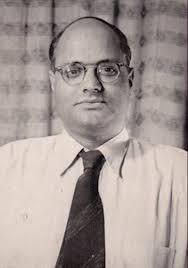 N. M. Rashid
N. M. Rashid
(N. M. Rāshid)
1910 – 1975
 N. M. Rashid
N. M. RashidN.M Rashid (N. M. Rāshid; 1910-75; also Rashed) was born Nazr Muḥammad (Nazr Muḥammad) in Akalgarh, Gujranwala District, Punjab, in what is today Pakistan. He is considered a major innovator in modern Urdu poetry. He received his M.A. in economics from Government College, Lahore, and worked as a journalist and government clerk before joining All India Radio just prior to World War II, one of the many young Urdu writers—viz., Miraji (1912-49), Akhtarul Iman (1915-96), Krishan Chander (1914-77), and Saadat Hasan Manto (1912-55)—who worked there then.
His first collection, Mā-varā (The Beyond; 1940), was highly controversial when it appeared. It also contained some of the first examples of sonnets as well as of vers libre (āzād naz̤m) in Urdu. In his introduction to this volume, Krishan Chander branded Rashed an escapist, for many of the poems dealt with subjects that were taboo and shocking to both Progressives and non-Progressives alike; for example, suicide, as in “Kẖudkushī” (Suicide),* and sexual seduction, as in “Ittifāqāt” (Accidents). Both groups disavowed such works. Rashed wrote the introduction to Naqsh-i faryādī (Image of Complains; 1942 or 1943), the first volume of poems by his friend Faiz Ahmed Faiz (1911-84), suggesting that the poet suffered from an Oedipal complex.
After partition Rashed worked for Radio Pakistan in Peshawar and in 1953 joined Voice of America radio as an Urdu announcer. He was later attached to the radio staff of the United Nations and served as director of the United Nations Information Center for Iran. He published three other volumes of poems, including Īrān men ajnabī (Stranger in Iran; 1957), in which, ironically, there is considerable social and political criticism. Lā = insān (0 = Mankind) appeared in 1969, and Gumān kā mumkin (Possibility of Doubt) in 1976. The former contains one of his most famous poems, “Mere bhī hain kuch k̲h̲vāb” (I Too Have Some Dreams).*
For some of the earliest translations of his poems into English, see Beloit Poetry Journal (Winter 1962-63) 47-50. For an interview with Rashid, together with translations of nine of his poems, see Mahfil: A Quarterly of South Asian Literature, 8:1-2 (1972) 1-30.
Also see The Poems of N. M. Rashed: A Poet of the Third World, tr. Muhammad Zakir (1995); Noon Meem Rashed’s Hasan the Pot Maker, and Other Poems, tr. Riaz Ahmad (2000); Muhammad Hasan Askari, “A Poem by Rashid: An Analysis,” Annual of Urdu Studies, 24 (2009) 118-21; Meeraji (Miraji), “Two Poems by Rashid: An Analytical Reading,” Annual of Urdu Studies, 24 (2009) 122-28; and A. Sean Pue, I Too Have Some Dreams: N. M. Rashed and Modern in Urdu Poetry, 2014).
1. Āʼīnah, ḥis o k̲h̲abar se ʿārī! / Mirror, Empty of Sense and Knowledge
2. Bekarān̲ rāt ke sanāṭe men̲ / In the Stillness of Endless Night
3. Bū-yi ādamzād / Smell of Mankind
4. Darīce ke qarīb / Near the Window
6. Isrāfīl kī maut / Death of Israfil
7. Iz̤hār aur rasāʼī / Expression and Access
9. Mere bhī hain̲ kuch k̲h̲vāb / I Too Have Some Dreams
10. Namrūd kī k̲h̲udāʼī / Nimrod’s Divinity
12. Ṣabā vīrān / Sheba in Ruin
Interview with N. M. Rashid, Mahfi: A Quarterly of South Asian Literature. 7:1-2. 1971. 1-20. Interviewer: Carlo Coppola.
Rpt in Nayā daur [New Dawn]. Karachi. September 1969. 50-59; also used as basis for the introduction to Lā = insān [X = Man]. Lāhaur: al Misāl. 1969. 1-36. (Urdu translation by the poet.)
Suggested Reading:
Pue, A. Sean. “Ephemeral Asia: Position without Identity in the Modernist Urdu Poetry of N. M. Rashed.” Comparative Literature. 64:1. 2012. 73-92.
__________, I Too Have Some Dreams: N. M. Rashed and Modernism in Urdu Poetry. Berkeley, CA: University of California Press. 2014. Extensive translations.
Rashed, N. M. The Dissident Voice: Poems of N. M. Rashed. New Delhi: Oxford University Press. 1992. Trans. M. A. R. Habib.
__________. Noon Meem Rashed’s, Hasan the Pot Maker, and Other Poems. Lahore: Ferozsons. 2000. Trans. Riaz Ahmad.

